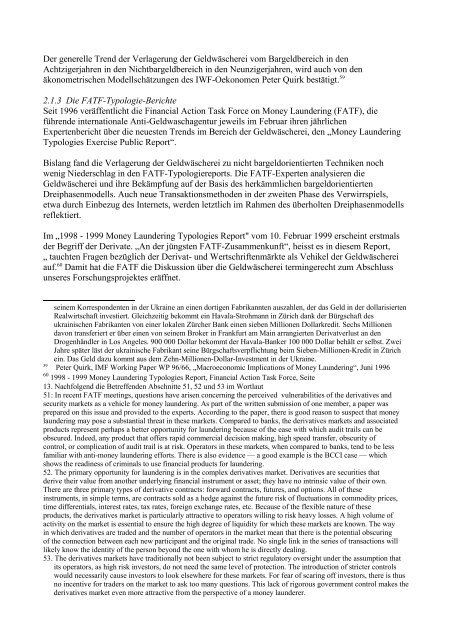Geldwäscherei mit Derivaten von Wolfgang Hafner und Gian Trepp
Geldwäscherei mit Derivaten von Wolfgang Hafner und Gian Trepp
Geldwäscherei mit Derivaten von Wolfgang Hafner und Gian Trepp
Erfolgreiche ePaper selbst erstellen
Machen Sie aus Ihren PDF Publikationen ein blätterbares Flipbook mit unserer einzigartigen Google optimierten e-Paper Software.
Der generelle Trend der Verlagerung der <strong>Geldwäscherei</strong> vom Bargeldbereich in den<br />
Achtzigerjahren in den Nichtbargeldbereich in den Neunzigerjahren, wird auch <strong>von</strong> den<br />
äkonometrischen Modellschätzungen des IWF-Oekonomen Peter Quirk bestätigt. 59<br />
2.1.3 Die FATF-Typologie-Berichte<br />
Seit 1996 veräffentlicht die Financial Action Task Force on Money La<strong>und</strong>ering (FATF), die<br />
führende internationale Anti-Geldwaschagentur jeweils im Februar ihren jährlichen<br />
Expertenbericht über die neuesten Trends im Bereich der <strong>Geldwäscherei</strong>, den „Money La<strong>und</strong>ering<br />
Typologies Exercise Public Report“.<br />
Bislang fand die Verlagerung der <strong>Geldwäscherei</strong> zu nicht bargeldorientierten Techniken noch<br />
wenig Niederschlag in den FATF-Typologiereports. Die FATF-Experten analysieren die<br />
<strong>Geldwäscherei</strong> <strong>und</strong> ihre Bekämpfung auf der Basis des herkämmlichen bargeldorientierten<br />
Dreiphasenmodells. Auch neue Transaktionsmethoden in der zweiten Phase des Verwirrspiels,<br />
etwa durch Einbezug des Internets, werden letztlich im Rahmen des überholten Dreiphasenmodells<br />
reflektiert.<br />
Im „1998 - 1999 Money La<strong>und</strong>ering Typologies Report" vom 10. Februar 1999 erscheint erstmals<br />
der Begriff der Derivate. „An der jüngsten FATF-Zusammenkunft“, heisst es in diesem Report,<br />
„ tauchten Fragen bezüglich der Derivat- <strong>und</strong> Wertschriftenmärkte als Vehikel der <strong>Geldwäscherei</strong><br />
auf. 60 Da<strong>mit</strong> hat die FATF die Diskussion über die <strong>Geldwäscherei</strong> termingerecht zum Abschluss<br />
unseres Forschungsprojektes eräffnet.<br />
seinem Korrespondenten in der Ukraine an einen dortigen Fabrikannten auszahlen, der das Geld in der dollarisierten<br />
Realwirtschaft investiert. Gleichzeitig bekommt ein Havala-Strohmann in Zürich dank der Bürgschaft des<br />
ukrainischen Fabrikanten <strong>von</strong> einer lokalen Zürcher Bank einen sieben Millionen Dollarkredit. Sechs Millionen<br />
da<strong>von</strong> transferiert er über einen <strong>von</strong> seinem Broker in Frankfurt am Main arrangierten Derivatverlust an den<br />
Drogenhändler in Los Angeles. 900 000 Dollar bekommt der Havala-Banker 100 000 Dollar behält er selbst. Zwei<br />
Jahre später läst der ukrainische Fabrikant seine Bürgschaftsverpflichtung beim Sieben-Millionen-Kredit in Zürich<br />
ein. Das Geld dazu kommt aus dem Zehn-Millionen-Dollar-Investment in der Ukraine.<br />
59 Peter Quirk, IMF Working Paper WP 96/66, „Macroeconomic Implications of Money La<strong>und</strong>ering“, Juni 1996<br />
60 1998 - 1999 Money La<strong>und</strong>ering Typologies Report, Financial Action Task Force, Seite<br />
13. Nachfolgend die Betreffenden Abschnitte 51, 52 <strong>und</strong> 53 im Wortlaut<br />
51: In recent FATF meetings, questions have arisen concerning the perceived vulnerabilities of the derivatives and<br />
security markets as a vehicle for money la<strong>und</strong>ering. As part of the written submission of one member, a paper was<br />
prepared on this issue and provided to the experts. According to the paper, there is good reason to suspect that money<br />
la<strong>und</strong>ering may pose a substantial threat in these markets. Compared to banks, the derivatives markets and associated<br />
products represent perhaps a better opportunity for la<strong>und</strong>ering because of the ease with which audit trails can be<br />
obscured. Indeed, any product that offers rapid commercial decision making, high speed transfer, obscurity of<br />
control, or complication of audit trail is at risk. Operators in these markets, when compared to banks, tend to be less<br />
familiar with anti-money la<strong>und</strong>ering efforts. There is also evidence — a good example is the BCCI case — which<br />
shows the readiness of criminals to use financial products for la<strong>und</strong>ering.<br />
52. The primary opportunity for la<strong>und</strong>ering is in the complex derivatives market. Derivatives are securities that<br />
derive their value from another <strong>und</strong>erlying financial instrument or asset; they have no intrinsic value of their own.<br />
There are three primary types of derivative contracts: forward contracts, futures, and options. All of these<br />
instruments, in simple terms, are contracts sold as a hedge against the future risk of fluctuations in commodity prices,<br />
time differentials, interest rates, tax rates, foreign exchange rates, etc. Because of the flexible nature of these<br />
products, the derivatives market is particularly attractive to operators willing to risk heavy losses. A high volume of<br />
activity on the market is essential to ensure the high degree of liquidity for which these markets are known. The way<br />
in which derivatives are traded and the number of operators in the market mean that there is the potential obscuring<br />
of the connection between each new participant and the original trade. No single link in the series of transactions will<br />
likely know the identity of the person beyond the one with whom he is directly dealing.<br />
53. The derivatives markets have traditionally not been subject to strict regulatory oversight <strong>und</strong>er the assumption that<br />
its operators, as high risk investors, do not need the same level of protection. The introduction of stricter controls<br />
would necessarily cause investors to look elsewhere for these markets. For fear of scaring off investors, there is thus<br />
no incentive for traders on the market to ask too many questions. This lack of rigorous government control makes the<br />
derivatives market even more attractive from the perspective of a money la<strong>und</strong>erer.


